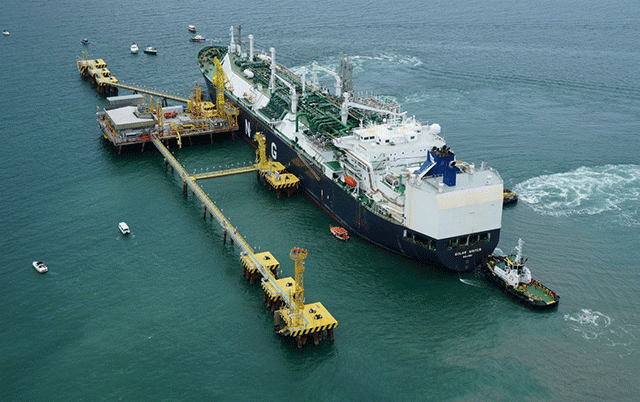LNG firm moves international court against PSO
Starts litigation after state company began deducting excess payments

The involvement of state companies in the liquefied natural gas (LNG) business has exposed financial risk to Pakistan as Gunvor – a supplier of the LNG – has filed a case against the Pakistan State Oil (PSO) in an international court.
The PML-N government had involved the private sector in setting up LNG terminals in Pakistan. But it involved state companies like the PSO and the Pakistan LNG Limited (PLL) in the LNG supplies business.
The PSO had signed LNG supply contracts with Gunvor and Qatar Petroleum. It had signed a contract for supply of 500 million cubic feet per day (mmcfd) from Qatar for a period of 15 years. It had also signed a short term LNG contract with Gunvor for supply of 100 mmcfd for a period of five years.
Later, the PLL also floated tenders for short term and long term contracts for supply of 100 mmcfd supply each. Gunvor had won both tenders floated by the PSO and the PLL for supply of the LNG that had raised eyebrows at that time.
The PLL had also floated a tender for a long term supply contract. An Italian firm, the ENI, had won the contract. It quoted the lowest price of 13.37 per cent of Brent to win a contract with PSO.
The PSO continued making excess payments to Gunvor on account of port charges for four and half years. Later, the PLL management pointed out that Gunvor was receiving excess payments from it.
Following this, a legal opinion was sought from an international firm that had assisted the Pakistani firms in finalizing the LNG supplies agreement with Gunvor.
Upon availability of the final port charges, the PLL promptly notified Gunvor on November 9, 2018 of its concerns regarding the calculations applied by Gunvor in provisional invoices.
The PLL again reached out to Gunvor on August 10, 2020 with a view to resolve this issue.
After the PLL management had identified excess payments Gunvor was receiving, the PSO deducted the excess payment. Subsequently, Gunvor filed a case against the PSO in an international court.
The PSO had a supply contract for five years with Gunvor that expired in December 2020. The PLL has also a five-year agreement with Gunvor for the LNG supply that would expire in December 2021.
Officials say the PLL had also started deducting excess charges from Gunvor and therefore, it was possible that another state run company – the PLL –would face a case in the international court.
The PLL had also been making excess payments to Italian firm ENI.
Officials said the PSO had a rule to blacklist any company that is involved in litigation with it. Now, Gunvor has filed a case in the international court and the PSO is likely to blacklist this firm.
The issue of excess payment to Gunvor had been brought into knowledge of the PLL board that decided to stop excess payment. An official of the PLL said now all parties had accepted that excess payment was made and invoices had been revised now.
Faulty decisions
The involvement of public sector companies in the LNG supply has not only resulted in exposing financial risks to the state companies but the entire chain of energy has been disrupted. According to the original plan, the PML-N government had started the LNG supply initiative for the power sector.
But the power sector has been reluctant to take LNG supplies and even the present government has freed the LNG power plants from guaranteed off-take.
The present government has also allowed the private sector to sell, market and import LNG for its use. But the state companies want to maintain their monopolies despite the fact they have completely failed to run this business.
Moreover, after failing to use the LNG in the power sector, the PTI government has diverted the LNG to the domestic sectors that has resulted in piling up circular debt.
The gas utilities are in a trap of over Rs78 billion due to absence of a legal framework in place to recover cost of imported gas from domestic consumers. Now, consumers use the LNG but the state company PSO is facing a legal battle in an international court.


















COMMENTS
Comments are moderated and generally will be posted if they are on-topic and not abusive.
For more information, please see our Comments FAQ